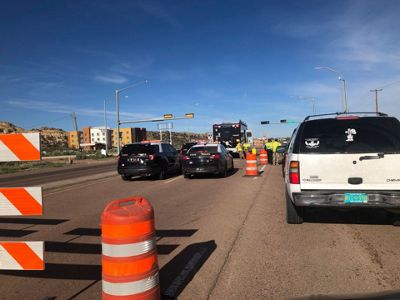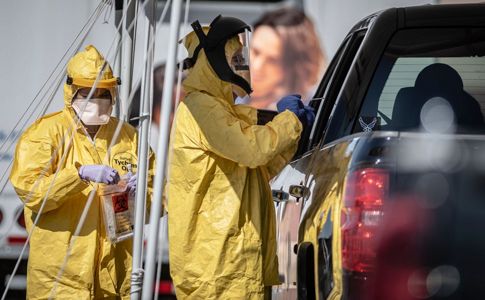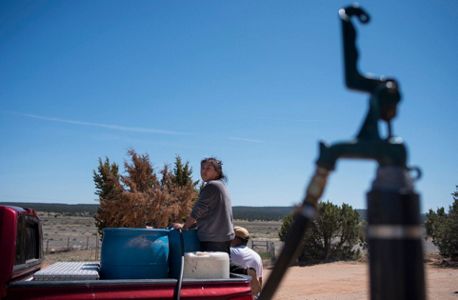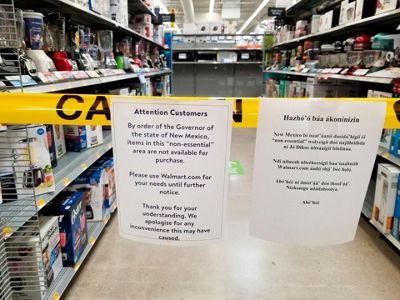GALLUP, N.M. (AP) — Traffic was almost nonexistent in this small New Mexico city, and just a handful of people waited their turn to get into grocery stores and other essential businesses. This place where rural residents from the largest American Indian reservation come to stock up on supplies is one of the nation's worst coronavirus hot spots, and the governor extended a lockdown Thursday to try to stem the spread.
The emergency declaration for Gallup, a gateway to the Navajo Nation, runs through noon Sunday. Patients have filled intensive care beds as COVID-19 infection rates here and in the surrounding county make the area one of the hardest hit by the pandemic. Health officials say per capita infections are 12 times that of New Mexico's largest city, Albuquerque.
Businesses will be closed from 8 p.m. to 8 a.m. Residents must stay at home except for emergencies. If they go out, they must wear face coverings to any essential business or government building.
But restrictions that blocked roadways into Gallup and prevented visitors from coming in are set to expire Friday evening.
The mayor asked Gov. Michelle Lujan Grisham to extend the emergency declaration — instituted under the state Riot Control Act — to help turn the tide in the community. Its surge has pushed the statewide number of cases higher each day.
Health officials fear Gallup, a popular supply stop for rural residents of the nearby Navajo Nation, became a vector for transmission at stores, restaurants and water fill-up stations used by people from the surrounding areas. When first imposing the restrictions May 1, the governor said physical distancing was not being maintained.
Federal health officials also linked the severity of the problem in Gallup to an early outbreak at a detox center, which was followed by infections among homeless people and nursing homes.
As of Thursday, McKinley County, where Gallup is located, had 1,402 confirmed coronavirus infections and 30 deaths. Intensive care beds are full at two hospitals, and patients with acute respiratory symptoms are being sent to Albuquerque.
Officers have blocked roads leading in and out of the city for the past week to restrict travel and business to emergency services and supplies, and only two people have been allowed per vehicle. On the north end of the city, vehicles lined up for more than a mile Thursday as drivers hoped to get through the checkpoint without realizing the emergency order had been extended.
Residents had mixed feelings about the lockdown. Still, most people getting groceries or running other errands Thursday wore masks. More than a dozen cars lined up outside one of the city's hospitals awaiting COVID-19 testing.
Tom Gorman, a retired veteran who cares for his elderly mother, was waiting his turn to get groceries. He had no issues with the lockdown and thought officials should do more.
"I think people should be more careful and listen and comply. Otherwise we're just prolonging the issue," he said.
Kylor Davidson, 24, said he's been stressed about the outbreak because he lives with his grandparents, who are in their 80s, and he's considered an essential worker. He drives a couple dozen miles a day into Gallup to work at a pizza parlor. Working and helping his family has been tough, he said.
“I come home and I literally have to tell them not to touch me,” Davidson said.
Mayor Louie Bonaguidi said the pace of infections has not fallen, though delays in test results make it hard to determine the success of the lockdown.
“Our concern was all of these people coming into town, that we’re going to spread it,” he said Wednesday. “We don’t want them taking it home to their families.”
Health officials reported two new COVID-19 deaths in McKinley County on Thursday and 65 new infections — the highest tallies among New Mexico's 33 counties.
The county is home to about 72,000 residents, including indigenous Zuni Pueblo and parts of the Navajo Nation.
Copyright 2020 The Associated Press. All rights reserved. This material may not be published, broadcast, rewritten or redistributed without permission.







